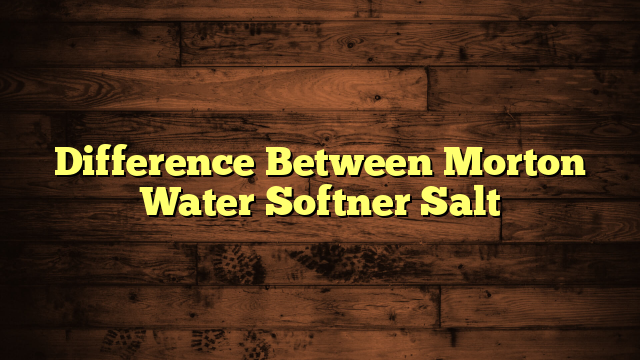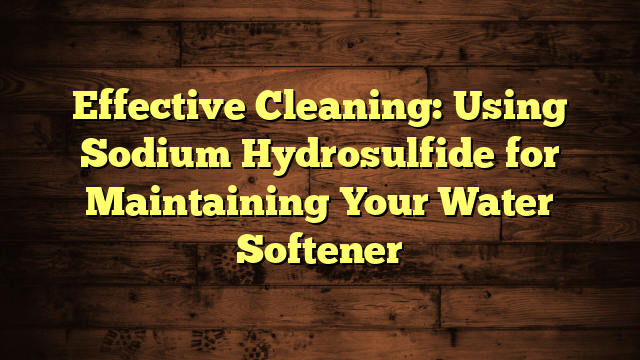Difference Between Morton Water Softner Salt
When you're considering Morton Water Softener Salt, it's essential to understand the differences among their various products. Each type serves a specific purpose, whether it's the common sodium chloride or the potassium chloride designed for low-sodium needs. You might find that certain options not only improve water quality but also protect your appliances. But with so many choices available, how do you determine which one fits your requirements? The nuances in composition and intended use can greatly impact your decision and overall satisfaction. Let's explore these distinctions further.
Key Takeaways
- Morton offers various salt types, including Clean and Protect, Salt Pellets, and Solar Salt, each designed for specific water softening needs.
- Sodium chloride is the primary ingredient in Morton salt products, facilitating ion exchange to reduce water hardness.
- Morton Clean and Protect prevents appliance buildup, while Salt Pellets are uniform and ideal for high-capacity systems.
- Solar Salt is eco-friendly, harvested sustainably through solar evaporation, making it suitable for diverse uses.
- Choosing between sodium chloride and potassium chloride impacts taste and health considerations, with potassium being preferable for low-sodium diets.
Overview of Morton Water Softener Salt
When it comes to maintaining your home's water quality, Morton water softener salt stands out as a popular choice. Known for its effectiveness in water softening, Morton salt helps eliminate hard minerals like calcium and magnesium from your water supply. This process not only enhances the taste of your water but also extends the lifespan of your plumbing and appliances.
Using Morton salt is simple; just add it to your water softening system as needed. The salt works by regenerating the resin beads in your softener, ensuring they can continue to remove those unwanted minerals.
You'll notice a significant difference in how your water feels and performs—softer skin, cleaner dishes, and less buildup in your appliances.
Moreover, Morton salt is widely available, making it convenient for you to find. It comes in various forms, each designed to cater to different water softening needs.
With its proven track record and reliable results, choosing Morton water softener salt can be a smart investment for maintaining your home's water quality. You'll appreciate the benefits of softer water in no time, making your daily tasks more enjoyable and efficient.
Types of Morton Salt Products
Morton offers a variety of salt products tailored to meet different water softening needs.
With these Morton salt varieties, you can find the perfect solution for your specific applications.
Here's a quick overview of three popular options:
- Morton Clean and Protect: This salt not only softens water but also helps prevent buildup in your appliances, making it a great choice for households concerned about efficiency.
- Morton Salt Pellets: These pellets are designed for high-capacity water softeners, ensuring a steady flow of soft water for larger households or commercial applications. Their uniform size promotes ideal dissolution.
- Morton Solar Salt: Harvested from solar evaporation, this eco-friendly option is perfect for those looking to soften water while being mindful of the environment.
It's suitable for both home and industrial use.
Key Ingredients in Morton Salt
When you choose Morton salt, you're primarily getting sodium chloride, but there's more to it than just that.
Some products include additives and enhancements that optimize performance in water softening systems. Understanding these key ingredients can help you make the best choice for your needs.
Sodium Chloride Composition
Sodium chloride is the primary ingredient in Morton water softener salt, playing an essential role in the softening process. This compound, commonly known as table salt, is critical for exchanging calcium and magnesium ions in hard water, which helps prevent scale buildup in your plumbing and appliances.
Here are three key sodium chloride uses that highlight its significance:
- Water Softening: Sodium chloride is fundamental for ion exchange systems, effectively reducing hardness in water.
- Food Preservation: Beyond softening, sodium chloride is widely used in food preservation, acting as a natural preservative.
- Chemical Production: It serves as a basic building block in various chemical processes, contributing to the production of products like chlorine and caustic soda.
When considering sodium chloride sources, you'll find that it's extracted from salt mines or evaporated from seawater.
Morton's water softener salt guarantees you have a reliable and efficient means to manage hard water issues. Understanding its composition allows you to appreciate how sodium chloride not only enhances your water quality but also plays a critical role in everyday life.
Additives and Enhancements
In addition to sodium chloride, Morton water softener salt often contains various additives and enhancements designed to improve its performance and effectiveness. These additives play an important role in providing additive benefits, ensuring your water softening process runs smoothly.
For instance, some formulations include potassium chloride, which not only softens water but also serves as a healthier alternative to sodium, making it a popular choice for those concerned about sodium intake.
Moreover, you'll find enhancement options like anti-caking agents that prevent clumping, ensuring your salt flows freely during the regeneration cycle. This is essential for maintaining the efficiency of your water softener.
Other additives may include rust inhibitors, which protect your plumbing from iron buildup, enhancing the longevity of your system.
When selecting Morton water softener salt, consider these additives and enhancements carefully. They can greatly affect the effectiveness of your softening process and the quality of your water.
Comparing Sodium Chloride vs. Potassium Chloride
When choosing between sodium chloride and potassium chloride for water softening, you'll notice key differences in their chemical compositions.
Sodium chloride is commonly used, but potassium chloride can offer a more environmentally friendly alternative.
Understanding these distinctions helps you make an informed choice based on your specific needs and values.
Chemical Composition Differences
While both sodium chloride and potassium chloride serve as popular options for water softening, their chemical compositions lead to distinct effects on water quality and health.
Sodium chloride (NaCl) is a common salt with high salt purity, making it effective in ion-exchange processes. However, it can contribute to elevated sodium levels in your water, which may not be ideal for those on a low-sodium diet.
On the other hand, potassium chloride (KCl) offers a different approach. Its chemical properties make it a suitable alternative, particularly for individuals concerned about sodium intake.
Here are three key differences between the two:
- Sodium Content: Sodium chloride adds sodium to your water, while potassium chloride replaces sodium with potassium, which may be beneficial for some.
- Taste: While sodium chloride can enhance taste, potassium chloride might've a slightly bitter flavor, which some find unappealing.
- Health Considerations: If you're watching your sodium levels, potassium chloride could be the safer choice, as it helps maintain a balanced electrolyte level.
Understanding these chemical composition differences can help you make an informed decision for your water softening needs.
Environmental Impact Considerations
Environmental impact is a crucial factor to take into account when choosing between sodium chloride and potassium chloride for water softening. Sodium chloride, while commonly used, has a significant ecological footprint. It can lead to increased salinity in water systems, harming aquatic life and affecting soil quality. This impact raises concerns about sustainable sourcing, as the extraction process often involves mining, which can disrupt local ecosystems.
On the other hand, potassium chloride presents a more environmentally friendly option. It has a lower ecological footprint compared to sodium chloride and is often sourced from more sustainable methods. Potassium is also an essential nutrient for plants, meaning that when it enters the soil, it can actually benefit agricultural practices rather than harm them.
When you're making your decision, consider how each option aligns with your values regarding environmental stewardship. If you're looking to minimize your impact on the environment, potassium chloride may be the better choice.
Ultimately, being informed about these differences will help you make a wiser decision for both your water softening needs and the health of our planet.
Benefits of Using Morton Salt
Using Morton salt for your water softening needs offers numerous advantages that can enhance your household experience. By choosing this product, you're not just making a smart choice for your plumbing; you're also reaping considerable health benefits and cost savings.
Here are three key benefits of using Morton salt:
- Improved Water Quality: Softened water reduces mineral buildup, which helps your appliances work more efficiently and last longer. This means fewer repairs and replacements, saving you money in the long run.
- Health Benefits: Softened water is gentler on your skin and hair. It can reduce dryness and irritation, making it a great choice for families with sensitive skin or allergies.
- Cost Savings: By preventing scale buildup in your pipes and appliances, you'll lower your energy bills and maintenance costs. This means a more budget-friendly household overall.
Incorporating Morton salt into your water softening routine can greatly enhance your home life, offering tangible benefits that you'll notice daily.
Environmental Considerations
Choosing Morton salt for water softening also brings up significant environmental considerations. While Morton emphasizes sustainable sourcing, it's important to understand what that means for you and the environment.
The company aims to minimize its ecological footprint by using resources responsibly, but it's still vital to reflect on how your choices impact the planet.
When selecting water softener salt, you might want to explore eco-friendly alternatives. Some options, such as potassium chloride, can reduce sodium levels in your water, making it a better choice for both health and the environment.
By opting for these alternatives, you can contribute to a more sustainable water management system.
Moreover, you should be mindful of the disposal of salt. High salt concentrations can harm local ecosystems if not managed properly.
Always follow local guidelines for disposal to minimize negative impacts.
How to Choose the Right Salt
Selecting the right salt for your water softener can greatly impact its effectiveness and efficiency. To make the best choice, you'll want to take into account a few key salt selection criteria and guarantee your choice aligns with your softener compatibility.
- Type of Salt: Different salts, like sodium chloride or potassium chloride, serve distinct purposes. Knowing which type your system requires is vital.
- Purity Levels: Look for high-purity options, as impurities can lead to clogs and reduced performance. Check the label for the salt's purity percentage.
- Brand Reputation: Choose a trusted brand that stakeholders recommend. Reliability can make a significant difference in your water softening results.
Tips for Optimal Water Softening
To achieve ideal water softening, it's important to maintain your system regularly and monitor salt levels consistently. Proper maintenance will not only enhance the efficiency of your water softener but also prolong its lifespan. Here are some effective water softening techniques and maintenance tips to keep in mind:
| Task | Frequency | Benefits |
|---|---|---|
| Check salt levels | Monthly | Guarantees optimal performance |
| Clean brine tank | Every 6 months | Prevents buildup and clogs |
| Inspect resin beads | Annually | Maintains softening efficiency |
Frequently Asked Questions
Can Morton Salt Be Used for Cooking or Food Preparation?
You shouldn't use Morton salt for cooking, as it's primarily designed for water softening. For food safety, stick to culinary salts, which are specifically processed and approved for food preparation and cooking uses.
Is Morton Salt Safe for Pets and Animals?
Morton salt isn't ideal for pets, as excessive salt can lead to salt toxicity. For your pet's safety, it's best to avoid giving them any salt, including Morton, to prevent health issues.
How Should Morton Salt Be Stored?
Oh sure, just toss Morton salt anywhere! But really, you should use airtight storage containers for ideal humidity control. Keep it dry and away from moisture, or you might end up with a salty science experiment!
What Is the Shelf Life of Morton Water Softener Salt?
The shelf life of Morton water softener salt typically lasts indefinitely if stored properly. However, salt degradation can occur over time, especially if exposed to moisture. Keep it dry to maintain its effectiveness for longer.
Can Morton Salt Harm Plumbing or Appliances?
Oh sure, let's blame Morton salt for your plumbing woes! If you keep up with plumbing maintenance, your appliances will thrive. In reality, it's neglect, not salt, that threatens appliance longevity. So, relax!
Conclusion
In summary, selecting the right Morton water softener salt is like choosing the perfect key for your home's harmony. Whether you opt for sodium chloride or potassium chloride, each type plays an essential role in ensuring your water is soft and your appliances run smoothly. By understanding their unique benefits and considering your health and environmental needs, you can make an informed choice that resonates with your lifestyle. So, plunge in and let your water shine!







